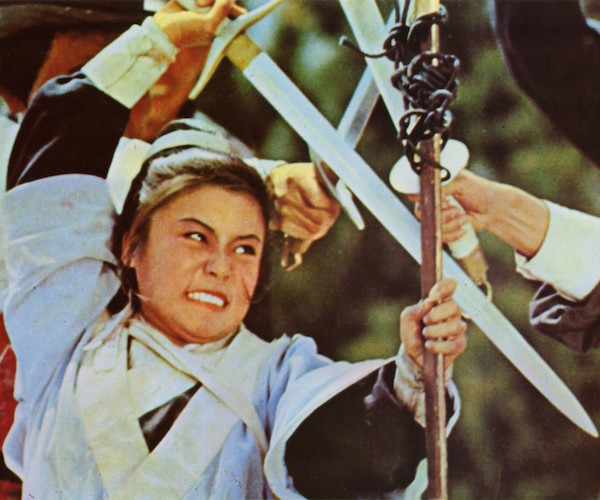Film Review: “Dragon Inn” — A Masterpiece of Martial Arts Cinema
This new restoration of Dragon Inn is not to be missed on the big screen.
Dragon Inn, directed by King Hu. At the Central Square Cinema, Cambridge, MA

A glimpse of a woman warrior in action in “Dragon Inn.”
By Peg Aloi
Filmed in the mountains, deserts and rural villages of Taiwan, King Hu’s Dragon Inn is considered the masterwork of martial arts (wuxia) cinema. This indispensable 1967 film has been recently restored to its original grandeur and is now being shown in cinema settings, including an exclusive engagement at the Kendall Square Cinema. This new restoration is not to be missed on the big screen. (I first became familiar with King Hu when I wrote a piece for Art New England on a retrospective of the director’s films back in the 1990s.)
Released just after the Cultural Revolution, but well in advance of the VCR revolution, King Hu’s Dragon Inn stands as one of the most influential films in the history of world cinema. Yet we know he had his role model — Hu was inspired by the westerns of Sergio Leone. The same archetypal situation served both masters: the intimate tension among bands of outlaws or warriors forced into small spaces (in western saloons or, in Hu’s world, in rural inns) serves as a powerful visual and narrative counterpoint to the vast expanses of desert and mountain scenery.
The other cultural trope that was greatly inspired by King Hu’s films was the role of women as martial arts fighters. First came Wonder Woman and Isis on Saturday mornings in the 1970s; maybe Cleopatra Jones and Foxy Brown showed a tinge of this subversive (at the time) feminist vibe. We would never have had Xena: Warrior Princess or Buffy the Vampire Slayer if King Hu hadn’t shown us feminine, noble women boldly wielding swords, staffs, and scimitars. And, of course, the opulent cinematography and gorgeous fight choreography that took the world of cinema by storm in 2000 with Ang Lee’s Crouching Tiger, Hidden Dragon owed much to Hu’s influence. Lee was born in Taiwan, where Hu lived in his later years, and he based a crucial scene in Crouching Tiger on a stunning sequence in Hu’s A Touch of Zen (1971). This obvious homage helped introduce film audiences to Hu’s body of work.
We also see some of King Hu’s influence in the eclectic mix of cinema styles and influences found in Quentin Tarantino’s oeuvre, most notably in the Kill Bill series. The quirky old fight master who schools the defiant young woman, the rich colors and lush settings, the triumphant victory of Uma Thurman’s skill and determination — all were inspired by Hu’s large-scale vision. The odd humor combined with visual effects was also a Hu trademark. He used it sparingly, but to great effect: as when a character in Dragon Inn tosses a full bowl of noodles at his enemies and it lands on the table in front of them without a drop spilled. Then there’s the 2003 cult indie film Goodbye Dragon Inn, which is set in a cinema screening the epic film. The narrative’s motley assortment of characters and odd happenings serve up a warm and witty commentary on cinema culture.
Hu was also a prolific actor, with significant experience as a script writer and designer of costumes and sets. The rich visual experiences found in his films are matchless; they are filled with exquisite, authentic detail. Dragon Inn‘s story? An emperor’s eunuch arranges the death of a detractor and banishment of his family. When the bad guy faces retaliation, he sends a band of secret police to strike first. There are mercenaries and warriors, crafty servants and evil monarchs, a gathering of badass men and women who brandish glittering blades, dressed in formal robes and flowing chinoiserie. The complicated story of revenge and honor is fairly easy to follow once it gets going but, as with many genre films, the energetic performances, colorful trappings, and stylish physical sequences are much more important than the plot. It may seem a bit surprising, but viewing Dragon Inn is sort of like watching a Chekhov play — with flashing swords and kicks and graceful fighting replacing the dialogue. Or maybe it is more like a classic American western, festooned with pristine embroidered silks. Ultimately, these comparisons are inadequate; King Hu’s Dragon Inn stands alone — a seminal example of a genre that continues to thrill admirers and fans throughout the world.
Peg Aloi is a former film critic for The Boston Phoenix. She has taught film studies for a number of years at Emerson College and is currently teaching media studies at SUNY New Paltz. Her reviews have appeared in Art New England and Cinefantastique Online, and she writes a media blog for Patheos.com called The Witching Hour.
Tagged: Dragon Inn, Kendall Square Cinema, King Hu, martial arts, Peg Aloi

I did catch a screening yesterday — and it really is a beautifully shot example of the wuxia genre — but I must confess, I still prefer the Tsui Hark produced and co-written 1992 remake, which despite the somewhat incongruous Sweeney Todd-like subplot, has, to my mind, a stronger script.